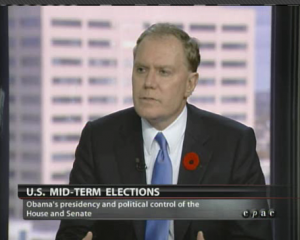Americans vote tomorrow in the U.S. midterm elections. Republicans hope to take back control of Congress and deal a blow to President Barack Obama’s power and prestige. As the American economy continues to struggle, Democrats are seeking to avoid the historic maxim that incumbents fare poorly between presidential elections. What do these votes mean for Canada, and what should we expect tomorrow night? CPAC’s Peter Van Dusen gets analysis from former Canadian diplomat Colin Robertson, and Christopher Sands, senior fellow with the Hudson Institute.
Excerpted from 2010 Midterms A Primer for Canadians
After having believed ourselves capable of transforming ourselves, we now believe ourselves incapable of improving ourselves; after having had an excessive pride, we have fallen into a humility that is just as excessive; we thought that we could do everything, and now we think that we can do nothing…This, to put it simply, is the great malaise of our age…”
– Alexis de Tocqueville
“The more you read and observe about this Politics thing, you got to admit that each party is worse than the other. The one that’s out always looks the best.”
– Will Rogers
American politics at the dawn of the 21st century is a brutal, bloody, winner-take-all game. As it should be. The stakes in political combat are not multi-billion dollar mergers or championship rings…There are no higher stakes than determining who runs the only superpower on God’s earth. Politics…is the only game for grown-ups…”
– James Carville
Forget the Giants and the Rangers, although that contest, too, has blue-red overtones, America’s real secular sport is politics. Thanks largely to television’s desire to distinguish between parties, each party has a colour: red for Republicans and blue for Democrats (the opposite of Canada’s Liberal red and Conservative blue). The parties even have their own bestiary. Thanks to the popularization of Thomas Nast of Harper’s Weekly, a mid-19th century American caricaturist, the Democrats have been associated with the donkey, while the Grand Old Party (GOP) rides the elephant.
The Democrats are the oldest political party in the world and John F. Kennedy used to take great pride in telling of the trip in 1800 that Thomas Jefferson and James Madison made up the Hudson River on a botanical tour searching for butterflies that ended up in New York City where they formed the Democrat Party. The original plans for the Republican Party were drawn up at a meeting in Ripon, Wisconsin at the First Congregational Church in 1854 in an action to stop the spread of slavery that united Whigs, Free Soilers and northern Democrats. The Republicans lost their first election to the Democrats but came back in 1860, led by a rail-splitting lawyer from Illinois, Abraham Lincoln. The Republicans would dominate American politics for much of the following seventy years. In the face of the Great Depression, Franklin Roosevelt became president and from 1932 to 1980, the Democrats were the majority party, especially in Congress. Since the election of Ronald Reagan, the GOP has won the presidency five out of eight elections. The Democrats have mostly been the majority in Congress except for an interregnum occasioned by one of the great ‘wave’ elections in American politics, when Newt Gingrich’s 1994 ‘Contract with America’ swept the Democrats from both the House and Senate.
De Tocqueville’s tour of Jacksonian America established the view of a populist, democratic and exceptional nation. Since the Revolution, Americans have delighted in mocking their politicians and for wit and insight Will Rogers remains the greatest American political humorist. Today’s political info-tainment has reached a new level as we saw at the recent ‘Rally to Restore Sanity and/or Fear’ hosted by Stephen Colbert and Jon Stewart at the Lincoln Memorial. But American politics is also, as James Carville reminds us, a blood sport…
Elections occasionally surprise pundits and pollsters alike. ‘Dewey Defeats Truman’ was the famously inaccurate banner headline on the front page of the Chicago Tribune on November 3, 1948. Few expected the breadth or depth of the ‘Contract with America’ Republican 1994 win in both the House and Senate.
Midterm elections are important but they rarely forecast the next presidential election. They are usually a referendum on the main issue of the day – usually the economy and occasionally foreign policy, the direction of the nation and, presidential leadership. Since 1900, the party in the White House has lost seats in the House of Representatives in every Midterm except for 1934 and 2002. Presidents who lost big in Midterms (Harry Truman in 1946, Ronald Reagan in 1982 and Bill Clinton in 1994) bounced back to win re-election.
In 2006, unhappiness with the war was a big factor in Democrats taking back the House of Representatives. In 2008, they enlarged their majorities in both houses. Voters were fed up with George W. Bush, worried by the collapsing economy and inspired by the hope generated by Obama’s ‘change that you can believe in’. Change came on health care, economic stimulus and financial reform but continuing high unemployment is hurting the Democrats. It’s a reminder of James Carville’s famous exhortation to Bill Clinton’s team in 1992: ‘It’s the economy, stupid.’
In 2008, the Democrats picked up 21 seats in the House, having gained 30 seats in the 2006 Midterms. In a sense, if the Republicans regain the House and the Senate is a near draw, we are back to the future. It will be even more so if Jerry Brown wins in California. In a couple of days, the 2010 Midterms will be history, but if you are feeling political withdrawal, then stop by your favourite bookstore on November 9th for a new political memoir, Decision Points. And the author? George W. Bush.

